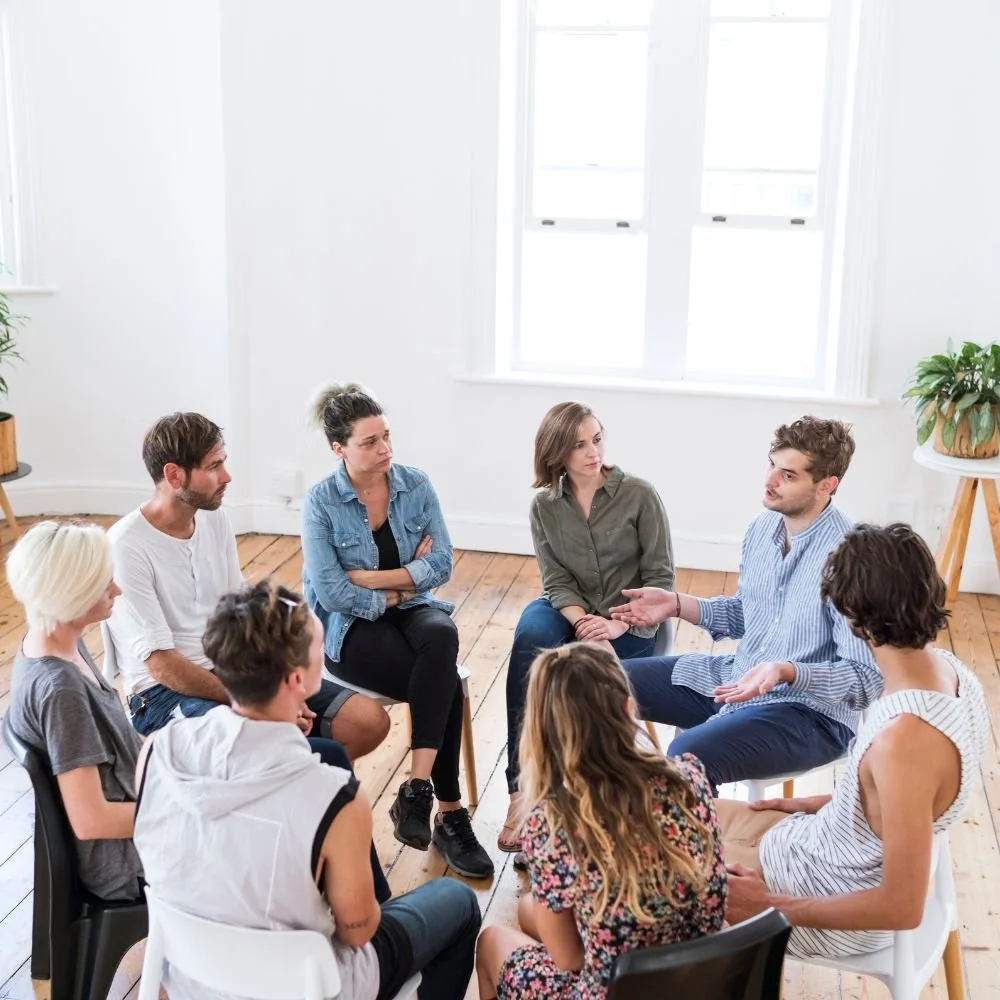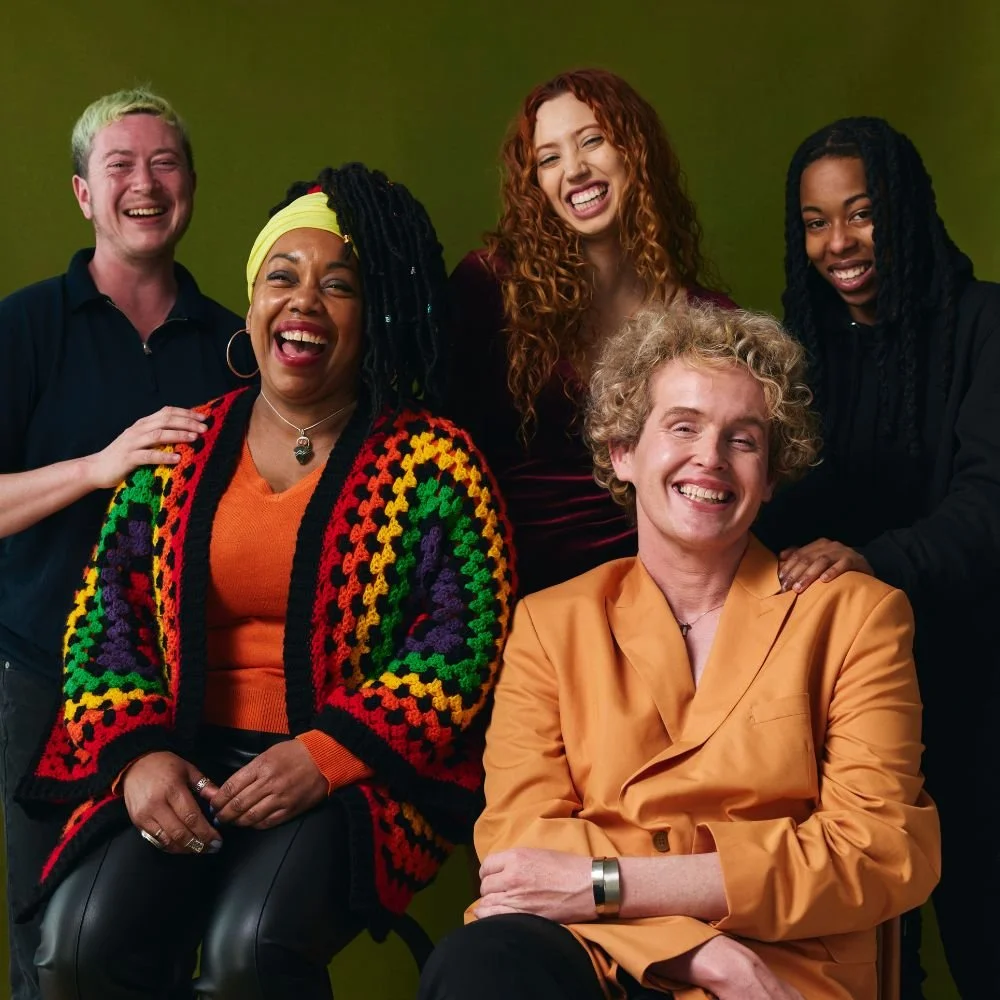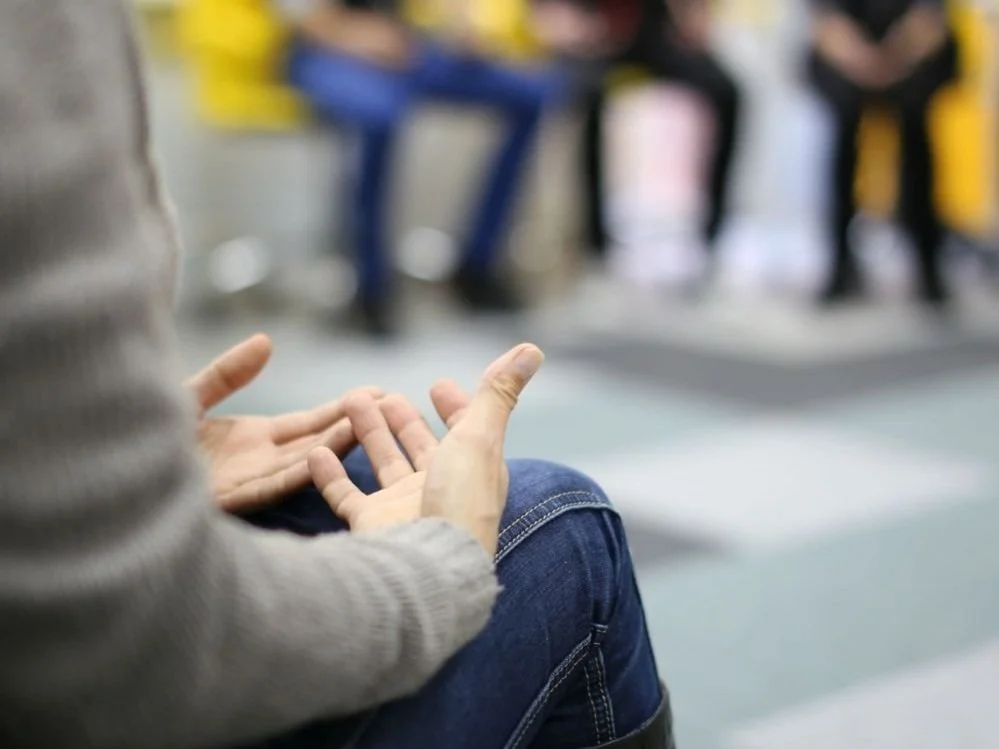Group Therapy Manhattan NYC
Support for LGBTQIA+ Adults
Feeling uncomfortable in your body can make even the simplest moments feel overwhelming. For LGBTQIA+ adults, body image, self-esteem, and confidence struggles often come with added layers of pressure, judgment, or past trauma. That’s why we created a safe, creative, and affirming space where people can reconnect with themselves, their bodies, and others on the same path.
TheBICS Group, Body Image, Confidence, and Self-Esteem is a unique, expressive arts therapy group led by licensed therapist Fallon Smalberg and psychologist Dr. Thomas Whitfield. Held virtually and open to participants across NY and all PsychPact states, this group therapy Manhattan program brings people together to grow, reflect, and feel less alone.
Why Others Trust EMDR / CBT Associates in Manhattan

What Is BICS?
BICS is an 8-week process group that combines evidence-based psychology with creative self-expression. It’s for adults aged 18+ who identify as LGBTQIA+ and who want to address long-standing struggles around how they see themselves and their bodies.
Each therapy session includes:
A brief mindfulness practice
Structured group check-ins and connection-building
A creative exercise (paper, pencil, watercolors, and any art materials are welcome)
Group reflection and gentle guidance from two experienced mental health professionals
You don’t need to be “good at art” to join, creativity is just the method, not the goal.
Who Can Join This Group?
This group therapy experience is for:
LGBTQIA+ adults (18+) looking to improve confidence and self-worth
People who feel disconnected or uncomfortable with their body
Anyone dealing with shame, internalized messages, or comparison
Individuals who feel isolated and want to connect with others facing similar challenges
No prior therapy experience is necessary. This isn’t a class, it’s a support group where vulnerability meets practice.
Why Group Work?
Unlike one-on-one counseling, group psychotherapy gives you something many individual sessions can’t: real-time connection.
When a group meets consistently over time, powerful things happen:
You hear others speak your thoughts before you’ve said them.
You realize your shame isn’t yours alone.
You gain confidence from both expressing and being heard.
Group dynamics, when facilitated by skilled group leaders, have been shown to improve psychological health, reduce isolation, and strengthen interpersonal skills.
Reach Out Today
Tools We Use in Group Sessions
The BICS group isn’t just about support, it’s about giving you useful tools that make a real difference. Each session includes approaches drawn from well-established therapies that help you understand yourself, feel safer in your body, and build confidence. Here’s a closer look at what we use:
Mindfulness
Mindfulness helps slow things down so you can feel more present and less overwhelmed. Whether it’s through breath, sound, or noticing your body, mindfulness is used at the start of each session to create a sense of calm and focus. It builds awareness and gently shifts you out of autopilot.
Cognitive Behavioral Therapy (CBT)
Cognitive Behavioral Therapy CBT helps identify the thoughts that shape how you feel about yourself. In a group, you’ll learn to recognize negative beliefs and start questioning how true or helpful they really are. This tool is especially effective for people working on confidence, self-esteem, and challenges like comparison or anxiety.
Acceptance and Commitment Therapy (ACT)
ACT supports you in noticing difficult thoughts without letting them control your actions. Rather than trying to erase discomfort, ACT teaches you how to live alongside it while still moving toward what matters. This is a helpful approach when working with shame or long-held critical inner messages. According to NCBI, ACT has been shown to reduce shame and self-judgment by fostering psychological flexibility
Motivational Interviewing
Motivational Interviewing is a conversational tool that helps you clarify what you value and what changes feel right for you. It’s not about pushing, it’s about exploring. In group, this approach helps you stay connected to your goals and strengthens your sense of direction without pressure.
Trauma-Informed Therapy
A trauma-informed approach means everything is done with care, consent, and respect for your emotional safety. Group leaders consider how past experiences may affect your comfort in the present. This approach helps build trust and supports nervous system regulation, especially for those who’ve felt unsafe in other spaces.
Expressive Arts Therapy
This group uses art as a way to explore emotion, identity, and self-image. You don’t need to be an artist just open to trying. Through drawing, coloring, and other creative forms, you’ll access insights that might not come through words alone. The focus is always on process, not product.
Is This Group Right for You? Here’s What to Know
Here are the key details to help you decide if the BICS group is right for you:
Schedule
Day: Thursdays
Start Date: End of October
Time: 6:00 PM – 7:00 or 7:30 PM ET (session length may vary based on group size and flow)
This group runs for 8 consecutive weeks (excluding the holiday break), providing consistent, structured support throughout the program.
Location
Format: Online via Zoom
Accessibility: Open to individuals living in New York and all PsychPact states
Great for: Those looking for flexible access to high-quality NYC therapy services without the need to travel
You’ll receive a secure link before each session. All you need is a private space, a reliable internet connection, and your materials.
Cost
Rate: $85 per session
Reimbursement: Sessions are eligible for out-of-network reimbursement
Sliding Scale: Available on a limited basis for those experiencing financial hardship
We aim to make this group therapy experience as accessible as possible while maintaining the quality of care provided.
Why People Join Therapy Groups Like This
Group therapy offers a different kind of support than individual work. For many people, being in a room, even virtually, with others who share similar struggles can ease feelings of shame, isolation, and self-judgment. According American Psychological Association, group therapy can enhance emotional resilience and interpersonal connection, making it a powerful complement to individual treatment
Participants often join this therapy group because they:
Want to build a healthier relationship with their body and self-image
Are looking for a sense of connection in a safe, identity-affirming space
Are interested in creative, expressive ways to explore emotional experiences
Value hearing and sharing with others who “get it” without explanation
Are seeking structured, professional support while also building community
What Happens in a BICS Group Session?
Each week, the BICS group provides a consistent and meaningful structure that blends creative expression with therapeutic reflection. While no two sessions are exactly the same, every meeting includes a blend of guided exercises and supportive connection.
Here’s what you can expect when the group meets:
Mindfulness Practice
Sessions begin with a short grounding exercise to help participants arrive fully and shift out of the busyness of the day. These practices might include breathing techniques, body scans, or simple visualizations. They help participants settle into the moment and create a calm, focused foundation for the rest of the session.
Community Building
Participants are invited (not required) to check in with the group, share experiences, or simply listen. This time builds trust and a sense of connection over the course of the 8 weeks. As people begin to open up, shared experiences often emerge, reducing feelings of isolation. Over time, the group becomes a space where mutual respect and emotional safety can grow.
Creative Expression
Guided by the facilitators, each session includes an expressive arts activity. Using markers, paints, pens, or collage, participants explore identity, body image, and emotion in a nonverbal format that complements verbal processing. These creative moments help externalize thoughts that are difficult to put into words. Art becomes a bridge between emotion and understanding.
Therapeutic Reflection
After the art activity, the group reflects together, supported by insight from licensed therapists. This time allows for themes to surface and for people to feel seen and validated in their experiences. Facilitators may gently highlight connections between what’s shared and common emotional patterns. Reflection helps participants deepen awareness and build language around their inner world.
Tools and Techniques
Across the sessions, participants are introduced to tools from evidence-based methods such as Cognitive Behavioral Therapy (CBT), Acceptance and Commitment Therapy (ACT), and trauma-informed care. These are shared conversationally, not as lessons, to help reinforce healthier internal dialogue and greater self-compassion.
Techniques are offered as invitations, not requirements, allowing each person to engage at their comfort level. The goal is to build practical emotional tools that support everyday growth beyond the group.
No artistic skill is needed. The focus is on self-discovery and connection, not on creating something “good.” What you bring, emotionally and creatively, is always enough.
7 Ways Group Therapy Helps with Confidence and Body Image
1. Normalizes Your Struggles
One of the biggest benefits of group therapy is realizing you're not alone. Hearing others talk about similar thoughts and feelings helps ease the idea that something’s “wrong” with you. That shared experience can be a huge relief and helps build a healthier relationship with yourself.
2. Creates Accountability
When you’re part of a group, showing up matters, not just for you, but for everyone. That shared commitment helps many people stay more consistent and focused on their own growth. Knowing others are walking this path with you can make the process feel more meaningful and less overwhelming.
3. Promotes Self-Expression
In this group, creativity is a tool for understanding yourself. You don’t need to be an artist just willing to explore. Through drawing, writing, or other simple materials, you’ll have space to express feelings that are hard to put into words, and gain new insight along the way.
4. Reduces Shame
Shame tends to grow in silence. In a supportive group, talking about the things you usually keep to yourself can lighten that load. Over time, it becomes easier to be open and to hear kindness from others instead of judgment. That shift can make a big difference.
5. Builds Relational Skills
Low self-esteem often affects how we connect with others. Group therapy gives you a safe place to practice things like listening, speaking up, and setting boundaries. These small moments help rebuild confidence in relationships and can carry over into friendships, work, and other parts of your life.
6. Encourages Reflection
Being in a group gives you time and space to think about how you show up both inside and outside the sessions. You’ll start to notice your patterns, reactions, and progress. This kind of steady reflection can lead to real, lasting change that feels grounded and personal.
7. Fosters Belonging
It’s powerful to be in a space where you feel seen and accepted just as you are. For many, that sense of belonging doesn’t come easily. In this group, connection builds slowly and safely, helping you feel more comfortable being yourself, with others and with yourself.
What Makes This Group Different?
There are plenty of support groups in NYC, so what makes BICS worth your time?
It’s LGBTQIA+ centered
It includes expressive arts work
It's run by licensed professionals with deep experience
It’s structured yet deeply personal
It’s virtual, accessible, and built around community
Our group practice isn’t focused on symptom-checking or quick fixes. We focus on creating space for change that sticks. What makes BICS especially unique is the combination of creative process and clinical care.
This isn’t a passive space or a one-size-fits-all program, every session is guided intentionally by a licensed group leader who understands the nuances of identity, expression, and emotional safety.
Our approach blends structure with flexibility so each participant feels supported at their own pace. We also keep group sizes limited to maintain intimacy and connection between members. You might be managing anxiety, working on self-image, or craving real connection, this group offers tools, community, and care that go beyond traditional therapy sessions.
Meet the Group Leaders
Fallon Smalberg, LMSW
Fallon is a licensed therapist with a passion for mental health equity and expressive practices. Her work blends deep empathy with evidence-backed approaches that empower clients to feel at home in their bodies.
Dr. Thomas Whitfield, PhD
Thomas is a clinical psychologist known for helping clients build real, sustainable self-worth. His background in trauma therapy, DBT, and LGBTQIA+ psychology grounds the group in both clinical wisdom and real-life connection.
Together, Fallon and Thomas co-lead every session, bringing both structure and heart to every meeting.

Take the First Step Toward Confidence and Connection
Ready to commit to change? Join our supportive group psychotherapy program designed for LGBTQIA+ adults. Each session is led by a licensed group leader and blends creative tools with real connection.
Book your appointment, explore our services, and begin your Manhattan wellness journey with trusted therapists who understand.
Frequently Asked Questions
-
Group psychotherapy involves structured sessions with a licensed group leader and peers who share similar goals. It provides connection, reduces shame, and builds confidence through weekly therapy sessions. The group setting allows members to feel seen, supported, and challenged in ways that individual therapy may not always provide.
-
Yes. While we are out-of-network, our therapy sessions are eligible for reimbursement through many insurance plans. We also offer a sliding scale. This makes our support groups NYC accessible to more patients who are seeking affirming care, especially for issues like body image, self-esteem, or anxiety.
-
Not at all. You don’t need any artistic background to join this NYC therapy group. Art is used as a tool for reflection, not skill. Many members who’ve never created anything before find it helpful for expressing emotion in ways they hadn’t accessed in traditional talk therapy.
-
Each of our therapy sessions includes mindfulness, sharing, guided creative exercises, and group reflection. Led by trained therapists, sessions help build emotional insight and reduce shame. They’re designed to be supportive, consistent, and empowering, especially for those navigating low self-worth, body image concerns, or anxiety-related challenges.
-
Booking an appointment is easy. You can visit our contact page, email us, or call. Our team will explain the process, answer your questions, and walk you through next steps. This is a low-pressure way to explore if our services are right for your current manhattan wellness goals.









